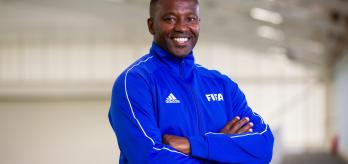Part 1 – Jens's goalkeeping journey
0:04
International career's standout moments
A standout moment for Jens's international career was his role as first-choice goalkeeper for hosts Germany during the 2006 FIFA World Cup™. The team's performance, the atmosphere created by the fans and the sublime weather made it an experience he will always treasure.
01:50
Penalty shootout hero
Germany's victory against Argentina in the quarter-finals of 2006 FIFA World Cup was a momentous achievement. After a spell of unsuccessful performances against elite teams, Germany were finally able to defeat a top footballing nation. Jens was centre stage, saving two and anticipating the right direction of all Argentinian penalties in the shootout.
03:08
Strengths as a young player
One of Jens's biggest strengths as a player was his ability to analyse his weaknesses. He was then able to improve these lacking areas, and by the age of 23, he was advanced technically with both feet, hands and decision-making.
04:36
Nature versus nurture
Jens had a good eye for reading the game, even at a young age. He believes that this may be because he used to play as an outfield player as a child. Despite having a natural ability to read the game, Jens points out he still had to dedicate time training the other aspects needed to make it as a professional.
Part 2 – The profile of a modern goalkeeper
00:05
Developments in goalkeeping over the last 15 years
When discussing developments in football, Jens refers to his time playing with Arsenal. In England, many felt he was too risky with his tendency to come high up the pitch to sweep and contribute to the play. Now, this type of goalkeeping has become far more popular, with the ability to pass with both feet and contribute to build-up being key facets of many present-day keepers.
01:10
Qualities of a modern goalkeeper
Jens lists mental resilience as a crucial skill for goalkeepers. A keeper must be able to organise the team from the back, which can lead to disagreements with team-mates. Keepers should be able to deal with this sort of backlash. Additionally, keepers should have good focus and concentration.
02:09
Coping with the pressure
Perfecting technique can feed self-confidence. Knowing you have the technical ability to deal with any game scenario is reassuring, especially during result-defining moments. Playing professional football from a young age is also essential for dealing with pressure. Even if this entails playing in third or second divisions, learning from other professionals how to cope in difficult situations is crucial for development.
03:12
Communication as an essential tactical skill
The goalkeeper is the communicator of the defensive line. During a match, keepers have an expansive view of the game, which they need to communicate to team-mates. Outfield players often ball-watch, forgetting their positioning as a result; one of a keeper's duties is to help players remain focused on their positioning in these situations.
Part 3 – The development of a modern goalkeeper
00:05
Jens's personal pathway as a goalkeeper
Jens enjoyed playing in goal as a child. Certain routines at a young age, such as daily stretches and jumping-power exercises before bed, helped lay the foundations for becoming a world-class goalkeeper. However, Jens admits some types of training could have been considered detrimental to his development. At times, an over-focus on endurance-based training would have been better replaced by sharp, explosive practices. Experiencing various drills is important for keepers to weigh up what works for them and what does not.
02:23
Technical development after youth development phase
Jens points out that it is unlikely that a keeper's technical development will be completed by the age of 16. Jens himself had to spend long periods cultivating the variety of skills needed to become an elite goalkeeper. Even in the latter stages of his career, Jens would still have to practice new techniques.
03:30
Training with shorter goalkeepers
It is first important to practice together with the keeper and watch them play matches. During this time, Jens pays particular attention to their mental strength. The time spent working with the goalkeeper is significant as this is where you can analyse the player and provide them with constructive advice.
04:02
Match-like conditions during the transition phase
Coaches need to ensure that their goalkeepers are practising in match-like conditions. This is crucial when a player is transitioning from youth to senior football. Without the experience of match-like conditions, young keepers can be overwhelmed when they play at the senior level.
05:11
Development during senior career
At Arsenal, Jens learnt the benefits of shorter, more intense drills. Because of the technical orientation of the club during this time, Jens also perfected passing with both feet. At 35 years of age, Jens had to change his training approach entirely to stay first-choice keeper. Hereafter, he would undertake shorter and more explosive drills that would help him sharpen up on the pitch.
You need to try to accept and cope with contact, pain and adrenaline already in training











